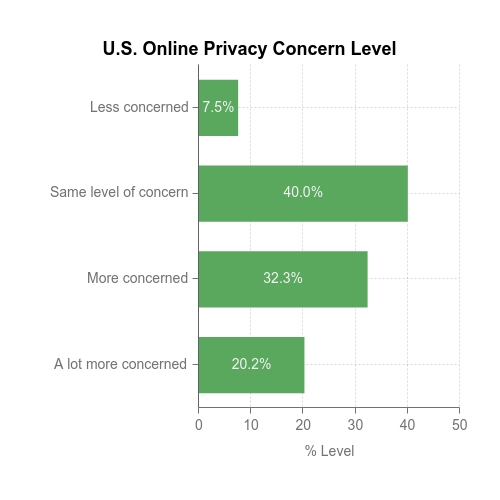How Concerned Are US Citezens About Their Digital Privacy?
We vetted and curated a list of the latest privacy statistics continuing in 2020. We also polled 1,000 anonymous people to get their take on the state of privacy compared to a year ago.

This study shows an overwhelming amount of americans having the same level of concern or an increasing level of concern. Furthermore, 52.5% are at least more concerned or a lot more concerend about their online privacy compared to a year ago.
These are the most recent and interesting privacy statistics we found:
- In 2020, 40% of American adults stated concerns about the misuse of their online data. (statista)
- 80% of social media users are concerned about advertisers and businesses accessing the data they share on social media platforms. (vpngeeks)
- Most concerning issues for mobile users about data privacy are identity theft and fraud (72%), stolen passwords (64%), Not knowing what personal information is used (59%), information being sold for profit (54%), location tracking (53%). (statista)
- Due to the COVID-19 global pandemic, online crimes reported to the FBI have quadrupled from 1,000/day to 4,000/day. (nozominetworks)
- 57% of Iot devices are vulnerable to medium or high severity attacks. (nozominetworks)
- According to a 2019 survey, over 80% of U.S. internet users felt that their data was vulnerable to hackers. (statista)
- 80% of Americans reported online privacy concerns due to their government in 2019. (statista)
- 34% of adults stated discomfort with the idea of tech companies sharing location data with the government. (statista)
- 4800 websites worldwide compromised by formjacking attacks every month, meaning users are duped into thinking that they are voluntarily sending their personal data to a trusted site which is in turn submitted to a cybercriminal. (vpngeeks)
- 1000% increase in malicious powershell scripts, a 2019 report states command line scripting language is being used by hackers. (broadcom)
Key Takeaways:
- A continuing trend in 2020, Americans are increasingly concerned about online privacy, even more so than the year before.
- Americans are concerned about companies collecting and abusing their data.
- Americans feel they are losing control of who sees their online searches and activity.
- Among various privacy threats, Americans are the most concerned about cybercriminals and hackers stealing their passwords, identity, and commiting fraudulent acts.
- Concerns about government mass surveillance have accelerated due to COVID-19 location tracking measures. Online crime reporting has quadrupled since the pandemic.
How to be safe online?
- Keep personal information limited online. If you do not want others to see certain information you have the power to dictate what information is publically availble for people to see.
- Keep privacy settings on. Marketers and hackers love to know all about you. Major websites like Facebook have privacy enhancing settings available. Ensure to safeguard your information.
- Make online purcahses from secure sites. Look for an web address that starts with 'https'. It may also be marked by a padlock icon next to the address bar.
- Choose strong passwords with the help of a password manager (Bitwarden, Dashline, NordPass)
- Make sure your internet connection is secure by using a VPN.
- Protect your computer with an anti-virus and malware blocker. Ensure to keep this updated.


